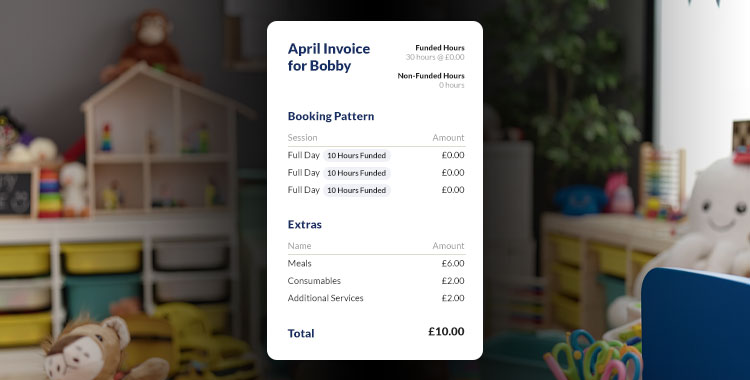Child development theories are crucial in shaping early childhood education, providing educators with a foundation for understanding how children grow, learn, and develop. By implementing these theories, childcare centres can ensure that every child receives the support and care they need to thrive. In this blog, we will explore how different child development theories can be effectively applied in nurseries and how Nursery in a Box supports this process with innovative tools and features that empower educators and enhance the learning journey.
The Importance of Child Development Theories
Child development theories provide a framework for understanding the stages and milestones of a child’s growth. Theories from renowned psychologists such as Jean Piaget, Lev Vygotsky, and Erik Erikson guide early years educators in creating an environment that fosters cognitive, social, emotional, and physical development.
Each theory offers unique insights into how children learn and develop:
• Piaget’s Theory of Cognitive Development focuses on children constructing knowledge through hands-on experiences.
• Vygotsky’s Sociocultural Theory emphasises the importance of social interaction and the role of adults in supporting learning.
• Erikson’s Psychosocial Theory highlights the significance of emotional and social development and addresses how children navigate critical stages of growth.
By understanding and integrating these theories into practice, childcare centres can provide experiences that promote holistic development and nurture a love for learning from an early age.
How Nursery in a Box Brings Child Development Theories into Practice

Nursery in a Box is a comprehensive nursery management software that supports the practical implementation of child development theories by offering tools that empower educators, streamline processes, and improve the quality of care provided to children. Here’s how Nursery in a Box can help put these child development theories into action:
- Tracking Developmental Milestones
Monitoring each child’s developmental milestones is fundamental to early years education. Nursery in a Box provides:
• Child Progress Tracking: Record observations and milestones for each child, allowing educators to monitor their development according to Piaget’s Cognitive Development stages.
• Visual Progress Reports: Generate reports that provide insights into a child’s cognitive, emotional, and physical development. These reports can be shared with parents to inform them of their child’s progress.
With these tools, educators can ensure that every child reaches key milestones, helping them tailor learning activities to each child’s developmental stage. - Supporting Social and Emotional Development
Vygotsky’s Sociocultural Theory emphasises the importance of social interaction for learning. Nursery in a Box helps support social and emotional development by providing:
• Group Activity Planning: According to Vygotsky’s theory, group activities should be planned and scheduled to encourage peer interaction and foster social development.
• Daily Diaries and Observations: Document social interactions and emotional responses, helping educators understand each child’s unique needs and adapt their approach accordingly.
• Parent Involvement Tools: Engage parents by sharing updates on their child’s social milestones, creating a partnership that supports the child at the nursery and home. - Building Trust and Independence
According to Erikson’s Psychosocial Theory, children must navigate stages that help them build trust, autonomy, and initiative. Nursery in a Box supports this process through:
• Daily Routines and Consistency: Create and maintain consistent routines that help children feel secure and build trust in their environment.
• Independence through Choice: Empower children by providing choices in activities, encouraging them to take initiative and develop autonomy in a safe and supportive setting.
• Positive Reinforcement Tracking: Track positive behaviours and accomplishments, celebrating successes to build children’s confidence and sense of achievement. - Customizable Learning Plans
Every child is unique, and their learning journey should reflect that. Nursery in a Box allows educators to create customisable learning plans that align with each child’s developmental needs:
• Individual Learning Journeys: Based on insights from child development theories, develop personalised learning plans that consider a child’s interests, abilities, and developmental stage.
• Observation-Based Planning: Use observations recorded in the system to adapt learning activities in real-time, ensuring that each child gets the support they need when needed.
• Holistic Development: Focus on all areas of development—cognitive, social, emotional, and physical—to create a well-rounded learning experience that nurtures the whole child.
Benefits of Using Nursery in a Box for Child Development
- Enhanced Observation and Documentation
Observing and documenting each child’s progress is essential for understanding their unique needs and supporting their development. Nursery in a Box simplifies this process by offering tools that:
• Automate Documentation: Quickly record observations and link them to developmental milestones, reducing the paperwork burden on educators.
• Visualise Progress: Use charts and graphs to visualise each child’s growth over time. This will help you identify areas where additional support is needed.
• Engage Parents: Share progress reports with parents through a secure portal, helping them stay involved in their child’s development and fostering collaboration. - Supporting Educators with Evidence-Based Practices
Educators need the right tools to put child development theories into practice effectively. Nursery in a Box provides:
• Training and Resources: Access training materials and resources that help educators stay informed about child development theories and best practices.
• Collaboration Tools: These tools enable staff to collaborate and share insights about each child’s progress, ensuring a consistent approach across the nursery.
• Planning Support: Templates and ideas aligned with child development theories simplify lesson planning, making creating meaningful activities that promote growth easier. - Fostering a Child-Centered Approach
Putting child development theories into practice means focusing on each child’s individual needs. Nursery in a Box helps create a child-centred environment by:
• Adapting to Each Child’s Needs: Provide tailored support for children at different stages of development, ensuring that no child is left behind.
• Encouraging Active Learning: Promote activities that encourage children to explore, ask questions, and engage with their surroundings, fostering an active learning environment.
• Tracking Emotional Well-being: Monitor each child’s emotional well-being and provide support where needed, ensuring that children feel happy, secure, and ready to learn.
Child Development Theories in Action with Nursery in a Box
Bright Minds Nursery used Nursery in a Box to implement personalised learning plans for each child. The platform’s observation tools allowed educators to track developmental milestones and adjust activities to suit each child’s needs according to Piaget’s stages of cognitive development—this improved engagement and learning outcomes for children across all age groups.
Happy Hearts Daycare enhances social development by organising group activities and documenting social interactions using Nursery in a Box. Following Vygotsky’s theory, they emphasised collaborative play, which led to more vital social skills and a better understanding of cooperative behaviour among the children.
Conclusion: Nurture Every Child’s Development with Nursery in a Box

Child development theories are more than just concepts—they are powerful tools that can transform how nurseries support the growth of young children. By using Nursery in a Box, educators can seamlessly implement these theories, ensuring that every child’s cognitive, social, emotional, and physical development is nurtured in a supportive and engaging environment.
If you’re ready to enhance your nursery’s approach to child development, Nursery in a Box is here to help. With features that simplify observation, documentation, and individualised learning, our software is designed to empower educators and create a nurturing space for children to grow.
Ready to support every child’s unique journey? Learn more about Nursery in a Box and schedule a demo today to see how we can help bring child development theories to life in your nursery.
Suggested Reading
Piaget’s Theory of Cognitive Development: Learn more about Piaget’s stages of cognitive development from the Simply Psychology website.
Vygotsky’s Sociocultural Theory: Explore Vygotsky’s theory of social learning and its application in early childhood education on the Verywell Mind website.
Erikson’s Psychosocial Development: The Psychology Today website provides insight into Erikson’s psychosocial stages and their significance for young children.
Benefits of Parent Involvement: Understand the importance of engaging parents in early childhood education from the National Association for the Education of Young Children (NAEYC).

Hannah
Marketing Manager




